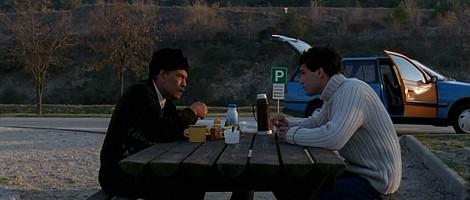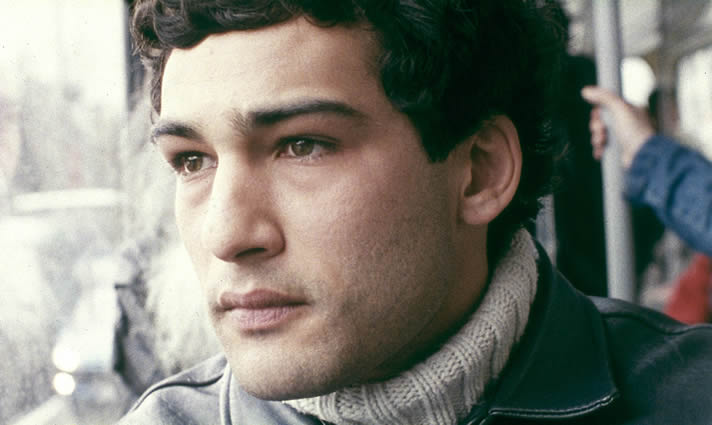Pilgrimage: Beyond Destination


Ismael Ferroukhi’s film Le Grand Voyage takes the viewer on a pilgrimage of soul, through subtle and striking transformations, writes MUHAMMED NOUSHAD.
There isn’t a thing called way; rather it is what you make when you walk, goes an Urdu saying. Le Grand Voyage is about the paths one is bound to take in a lifetime. Not in the obligatory sense of the ritual pilgrimage. It is rather about the paths one needs to traverse inside oneself. The toughest of the voyages and the most dangerous of the adventures has always been the one made through the dark depths of one’s own soul. No wonder, every religion on the earth has a philosophical point, with a mythological under-narrative, about a holy place to reach. The destination has never been the sole destination. It was more about the willingness to set out, to transcend the painfully fragile imperfections of the flesh, to be on the road or the sea with a myriad of uncertainties, to sleep under unimagined roofs on the way, to meet and share life’s simple joys and profound miracles with people whom we didn’t know ever existed at all and, more importantly, to face the suffering of life with love and patience; and, eventually, to transform oneself, if there is an urge to. Le Grand Voyage, a remarkable road movie written and directed by Ismael Ferroukhi in 2004, talks a lot about all these possibilities, in the context of a Hajj pilgrimage.
The storyline on the surface is simple: a young Moroccan French boy is asked by his strict and devout father to be driven from Southern France to Mecca. In a sense, the film is about endless negotiations between the two generations, two cultures, or rather the cultural generation gaps that the immigrant Muslim community has developed in the West. It is also about the slowly changing relationship between a father and a son. And, as a road movie, it is about the places and cultures their vehicle passes through from France to Saudi Arabia, too – a part the script and the camera did not highlight much, unfortunately, despite a cross-European car journey.

“When the waters of the ocean rise to the heavens, they lose their bitterness to become pure again.”
The old and unhealthy father is a man of character and strength. His silences are eloquent; like a mystic, he speaks more with his eyes and opens his mouth only when there is an urgent necessity. Sometimes, you feel the sole purpose of his pilgrimage, about which he has been planning for a lifetime, is to help his son find enlightenment. His refusal to spend nights in the beautiful cities on the way, against his son’s wish for sightseeing, with a stark comment that “we are not tourists”, reflects an attitude. When he takes his son’s cell phone and leaves it in a garbage can, while the son was asleep, one even doubts his integrity. He explains it later to his angry son that the cell phone didn’t allow the boy to be with him, despite his physical presence. His secret phone calls to his French girlfriend are now made impossible. In today’s context of excessive mobile communications, this insightful act offers a way to go to places where technology doesn’t allow one to go (remember those frequent complaints about those pilgrimaging men and women spending their holy hours at Arafa scrolling on their mobile screens!)
The son, Reda, being in preparations for an important examination, is obviously unwilling to join the journey from the very beginning. His bond with girlfriend Lisa serves an emotional reason. He has a simple question, which sounds very logical too: Why does his father not fly to Mecca like everyone else? Later, in the middle of a lost path, in a snowy evening, he gathers courage to ask this question. The father tells him a parable from his childhood, briefly explaining the essence of the notion of pilgrimage. He explains: “When the waters of the ocean rise to the heavens, they lose their bitterness to become pure again. The ocean waters evaporate as they rise to the clouds. And as they evaporate they become fresh. That’s why it’s better to go on your pilgrimage on foot than on horseback, better on horseback than by car, better by car than by boat, better by boat than by plane.”

In great journeys, the one who returns is not the one who sets out.
The father-son relationship has its compelling ups and downs in the movie. The moments of attitudes collide with each other and often yield to deeper dimensions of understanding the other person. In the political context of the troubled post-9/11 status of immigrant Muslims in Europe, they can be called a “good Muslim” and a “bad Muslim” on a same trip. Both undergo transformations: the son in the direct sense and the father in a subtle way. The father seems to approve his relationship with his French girl friend Lisa, by placing her photograph on the car’s dash board. The man who saves them at a border seems to represent a middle Muslim path, between western secularism and Islamic piety. He leaves the path midway.
The relationship between the father and the son becomes touchingly unforgettable towards the end. Their bond is like the climates and landscapes they pass on the way. Moments of confusion, the quintessential deserted divergences of the road, long silences, the mystical hitchhiking woman, trans-border miseries, mistaken accusations and the paths being lost and rediscovered; Metaphors are in abundance. The last scene, suggesting the completion of the transformation of the young boy, is beyond cliché. The extreme long shots of the paths invite you to be on the road. In great journeys, the one who returns is not the one who sets out, like the young protagonist, Reda.
Written and directed by Ismael Ferroukhi / Language: Moroccan Arabic, French / Year: 2004 / Duration: 108 minutes / Trailer: https://www.youtube.com/watch?v=mDIu4mjXKTg.
[Originally carried by Interactive website: http://www.islaminteractive.info/content/pilgrimage-beyond-destination]